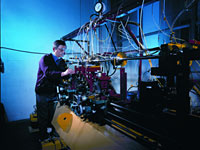|
||||||||||||||||||||||||||||||||||||||
| Mechanical Engineering | ||||||||||||||||||||||||||||||||||||||

Mechanical Engineering is concerned with the design, development, construction, operation and maintenance of machines, plants and factories.
The purpose of many machines is to produce, to transmit and to use power. A motor vehicle, having an engine, a drive-line and a suspension system is a typical example. Robots, aircraft engines, household appliances and equipment for agriculture, construction and mining are examples of other machines. Much of the equipment installed in large buildings and factories is essentially mechanical. Examples include building lifts and air conditioning plants. Steam generators and turbines are major mechanical elements in power stations which generate electricity. Mechanical Engineering is the most diverse of the engineering disciplines in terms of both the industries it serves and the activities which it involves. The activities of Mechanical Engineers are essential to society and there is often great satisfaction in undertaking this vital work. Further, because of the fundamental importance of these activities, there is stable employment in associated industries. The power generation industry is an example. However, because of the diversity of activities and skills associated with Mechanical Engineering, there is also a wide range of exciting employment opportunities for both men and women in Australia and overseas. Studying Mechanical Engineering at UNSW The study of Mechanical Engineering is primarily though the School of Mechanical and Manufacturing Engineering (www.mech.unsw.edu.au). At the undergraduate level, Mechanical Engineering is available within the Bachelor of Engineering program (3710) and relevant combined degree programs. Postgraduate research and coursework programs are also offered by the School.
Mechanical Engineering can be studied in the following Programs
|
||||||||||||||||||||||||||||||||||||||



